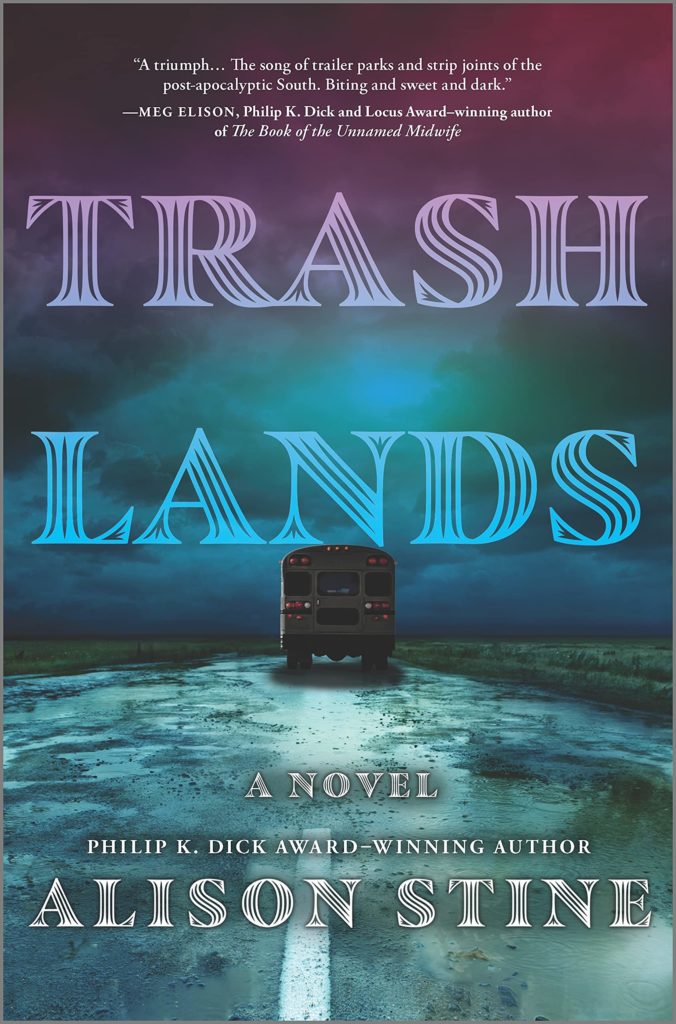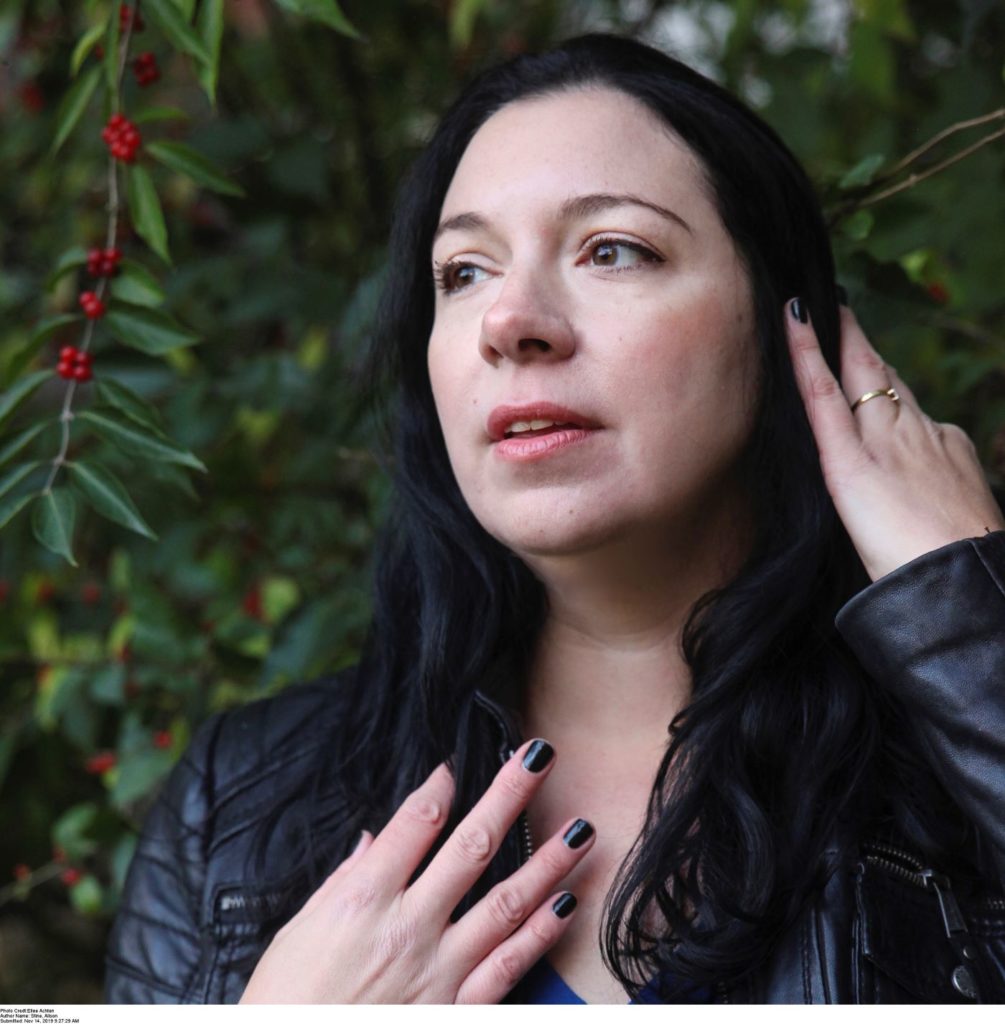I’ve read both Trashlands and Road Out of Winter by Alison Stine and been so impressed with both of them. The world building is so stunning and immersive. So when I had the opportunity to interview Alison Stine I was so excited!
About Trashlands

A few generations from now, the coastlines of the continent have been redrawn by floods and tides. Global powers have agreed to not produce any new plastics, and what is left has become valuable: garbage is currency.
In the region-wide junkyard that Appalachia has become, Coral is a “plucker,” pulling plastic from the rivers and woods. She’s stuck in Trashlands, a dump named for the strip club at its edge, where the local women dance for an endless loop of strangers and the club’s violent owner rules as unofficial mayor.
Amid the polluted landscape, Coral works desperately to save up enough to rescue her child from the recycling factories, where he is forced to work. In her stolen free hours, she does something that seems impossible in this place: Coral makes art.
When a reporter from a struggling city on the coast arrives in Trashlands, Coral is presented with an opportunity to change her life. But is it possible to choose a future for herself?
(Disclaimer: Some of the links below are affiliate links. For more information you can look at the Policy page. If you’re uncomfortable with that, know you can look up the book on any of the sites below to avoid the link)
Find Trashlands on Goodreads, Amazon, Indiebound, Bookshop.org & The Book Depository.
Author Interview
The world building is one of my favorite elements, can you talk about how TRASHLANDS came to you? Did you think of the concept, the characters, or the world first?
I’m the sort of writer who gets a lot of ideas, and it can be hard sorting through what’s urgent and what can wait. But I don’t remember my dreams too often, so when I do, I know it’s special, worth paying close attention. I dreamed Coral, the main character of TRASHLANDS. I dreamed what she looked like. I knew she had been a young mom, not by choice, and I knew she was an artist. I also knew she lived in a bus—which is where I was sleeping at the time. The world fell into place around her and around the community members of TRASHLANDS who started coming then, one by one. People built the world of TRASHLANDS.
What kind of research did you have to do for TRASHLANDS?
Not much going in. I think too much research early on in the process can slow things down, not make you want to write or invent. It’s hard to turn away from facts in the beginning, and you need freedom to just write. But in revision, my editor and I worked a lot on researching plastic: the types, their properties, what plastic floats, what is more or less durable. I was surprised to discover that some of the ideas of TRASHLANDS—turning melted plastic into bricks, for example—are already happening in the world, our world.
Which was the easiest character for you to write? Did you have a favorite or one that came to you first/last?
Foxglove. I like writing what might be considered “mean girls,” maybe because I don’t think I’m brazen or blunt in my waking life. I’m partially deaf, and in the abled world, I hang back and observe, just try to listen. In my first novel, ROAD OUT OF WINTER, it was the character of Jamey, a trash-talking teen mom that I loved. Both her and Foxglove are survivors. Foxglove is deeply loving and loyal, despite her brittle exterior. It’s a shell, of course. I think of her and Coral as the bookends of the story, two threads that sometimes run parallel, interweave, and ultimately divide.
In some ways, it’s hard to wrap my head around the immense shift it would be in the world of TRASHLANDS. What do you think would be the smallest difference which would be the hardest for you? For example, I need glasses to basically do anything so that would be disastrous for me.
I think possibly being separated from my family, not having a way to at least call or text. Some of the scenes of TRASHLANDS were just devasting for me to write because you just don’t know what’s going to happen in that world if you leave your home. As Mr. Fall says in the book, “Once you left a place, it was hard to come back…You forgot the way. Or the way was blocked.” You may never get back. I took the emotion I felt early in the pandemic, when I ended up myself moving away from home and my parents, not knowing when I was going to see them again because it wasn’t safe to travel, and magnified it.
If you were in the world of TRASHLANDS, what do you think you’d be doing?
Herbalism. I come from small family farms, on both sides of the family. My grandfathers were foragers, and my parents taught me to pick mushrooms. Living in rural Appalachia, I learned even more as an adult about plant identification. Plants are a huge part of my life: growing them, learning from them, just walking in the woods. I’m not sure I could be a healer like Ramalina or Bee, but I would definitely be a person that you could come to in order to find out if these berries were edible, or what plants might soothe a cough.
I love the larger hints of the world you hint at in TRASHLANDS which is outside of the major focus of action, do you have plans to explore other parts of that world?
I don’t right now. But I’ve always loved sequels which aren’t straight sequels; they aren’t a direct continuation of the action, but instead take a minor character and expand on their story, maybe in the future or past, showing their side. I could envision doing something like that, especially with a community like TRASHLANDS which is full of people I ended up falling in love with.
What kind of tv/films/music do you think would go well with TRASHLANDS?
I was listening to Jessica Lange’s cover of Lana Del Rey’s “Gods and Monsters” over and over again as I revised the book, along with Lana’s “Swan Song.” I don’t listen to music while I write, but in revision, I tend to obsess over certain songs, to use them as the backbeat or heartbeat of the story. I also watched the 2018 film Mandy early in revising of TRASHLANDS, and it quickly became my favorite. So, I think the book pairs with intense, dark, women-fronted music about performing (which is so much a part of TRASHLANDS and the club at its named after), and films deep with emotion—passion, commitment, and trust; the love that doesn’t go away.
Find Trashlands on Goodreads, Amazon, Indiebound, Bookshop.org & The Book Depository.
About the Author

ALISON STINE is the author of the novel Road Out of Winter (MIRA / HarperCollins). A 2020 The Rumpus Book Club selection, Road Out of Winter won the 2021 Philip K. Dick Award.
Also the author of three poetry collections and a novella, her next novelTrashlands releases October 26, 2021 from MIRA / HarperCollins.
Recipient of an Individual Artist Fellowship from the National Endowment for the Arts, an Ohio Arts Council grant, a Sustainable Arts grant, and a reporting grant from National Geographic, she was a Wallace Stegner Fellow at Stanford University, a Ruth Lilly Fellow from the Poetry Foundation, and received the Studs Terkel Award for Media and Journalism. Partially deaf, she works as a freelance reporter with The New York Times, and also writes for The Washington Post, The Atlantic, 100 Days in Appalachia, and more. After living in rural Ohio for many years, where she was raised and where her son was born, she now lives in Colorado with her family.